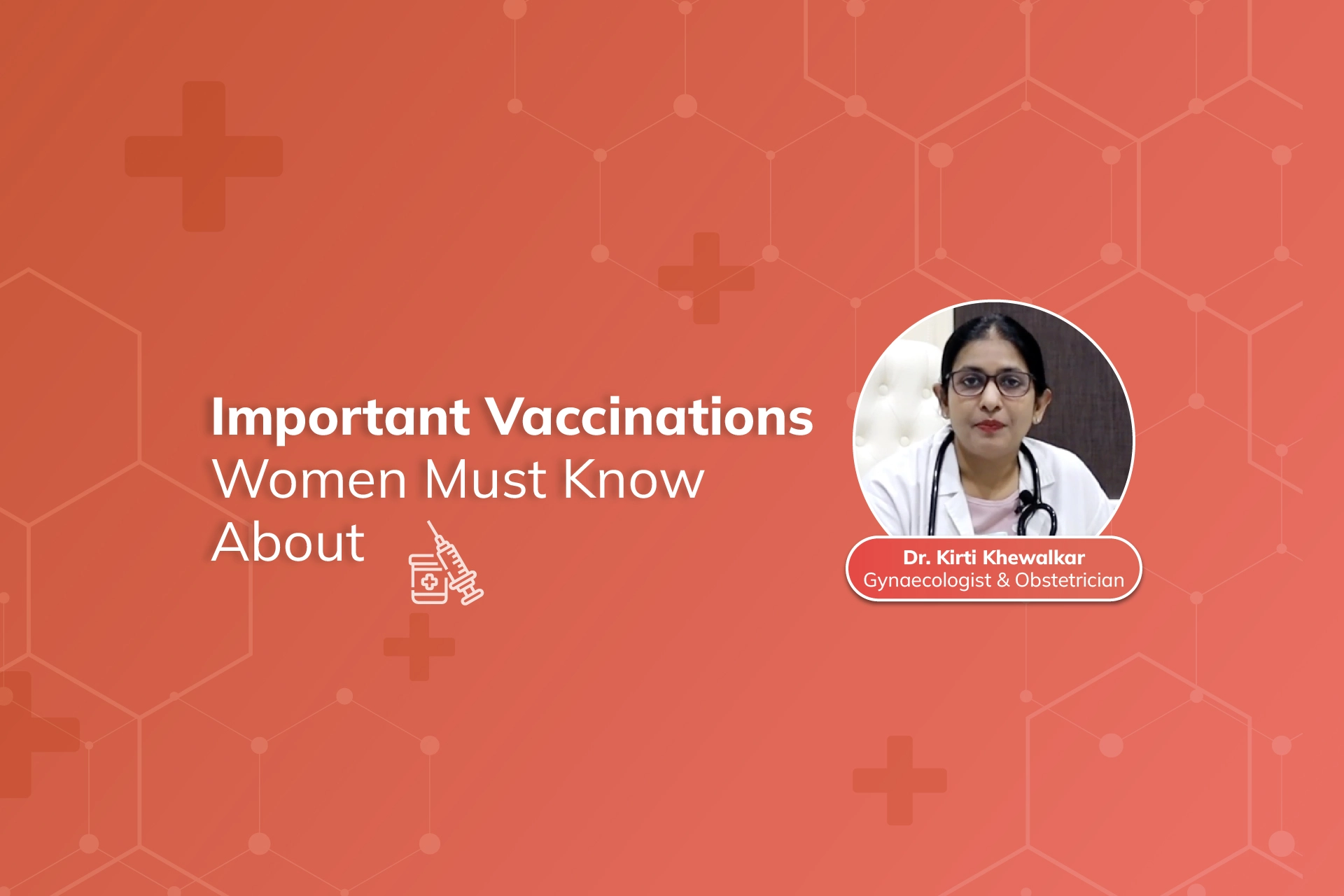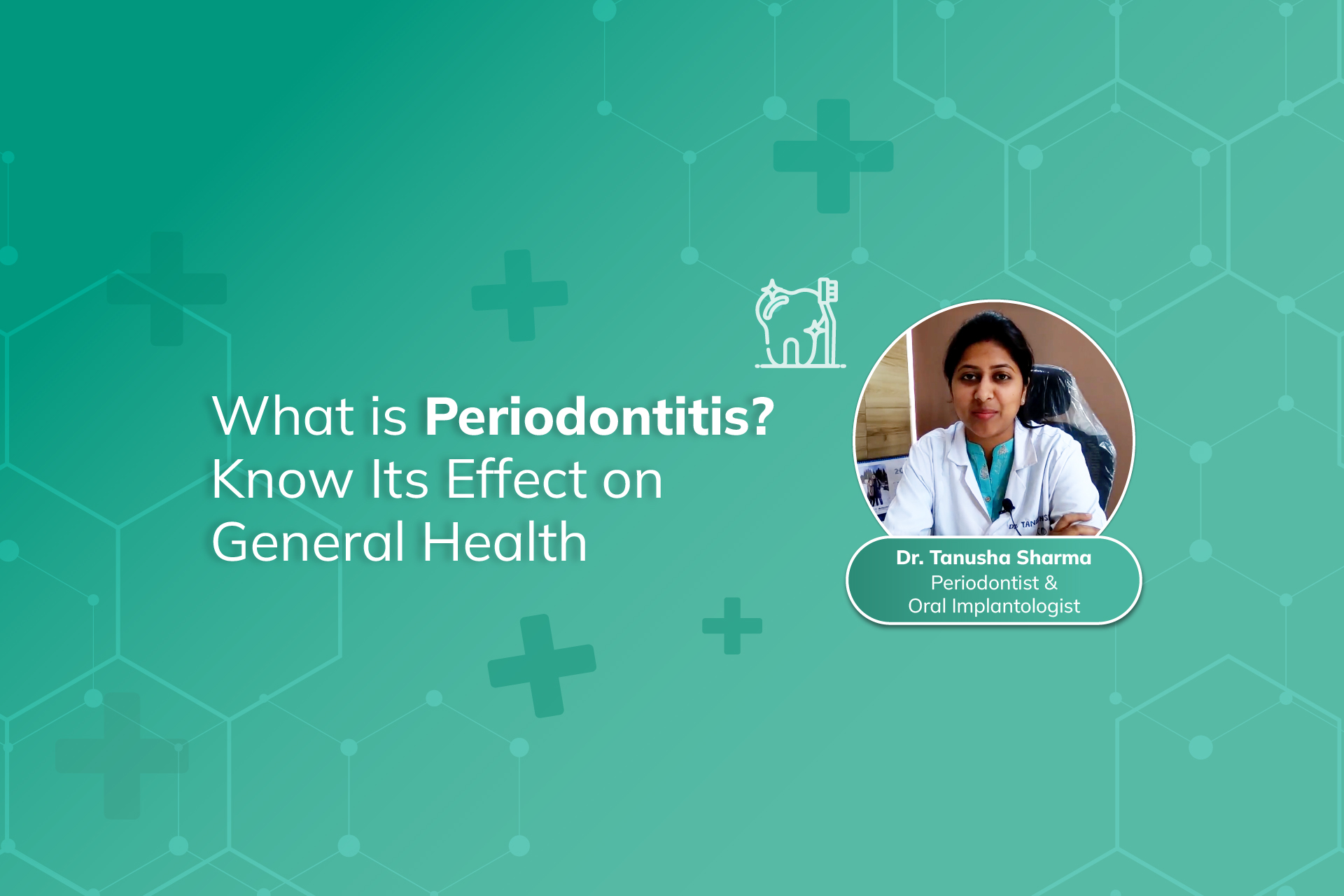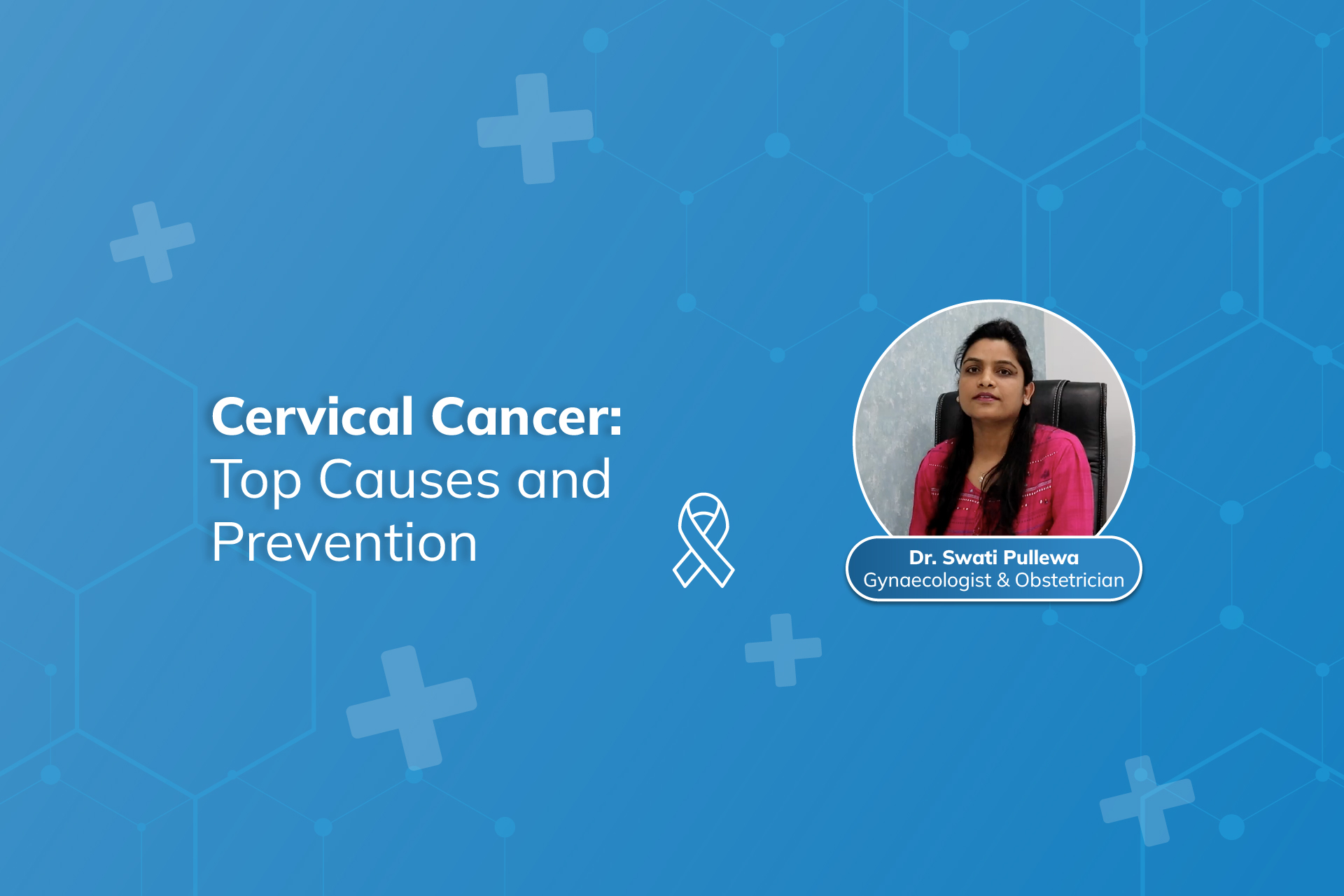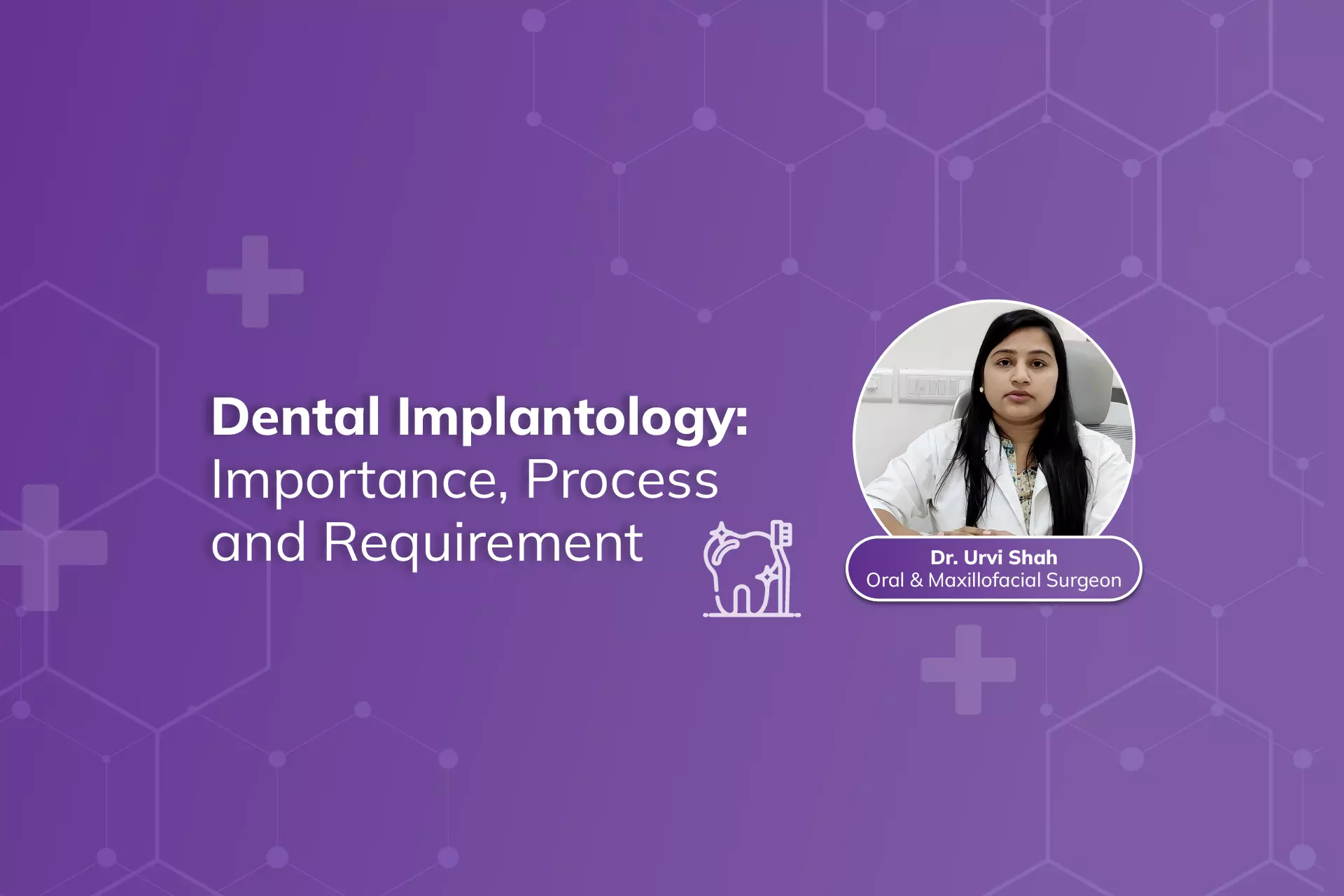Gynaecologist and Obstetrician | 7 min read
Important Vaccinations Women Must Know About by Dr. Kirti Khewalkar
Medically reviewed by
Table of Content
Synopsis
There are multiple vaccines available for women between the ages of 11 and 45 that are important for their health, such as tetanus, diphtheria, pertussis, influenza, HPV, Rubella and more. Know why you must get these vaccinations with helpful insights by expert Gynaecologist and Obstetrician Dr. Kirti Khewalkar.
Key Takeaways
- Tetanus shots are important for pregnant women to prevent infections
- Pertussis (whooping cough) is a highly contagious respiratory infection that affects women
- HPV vaccines can be given to girls and boys aged 10 to 12 years
Vaccination during pregnancy is very important for the health of the woman and the baby. However, there are more vaccines available for women, and the subject of vaccinations for women between the ages of 11 and 45 is an important one. Furthermore, with the prevalence of many diseases that tend to affect women more than men, women need to be aware of the vaccinations and available treatments.
To understand the vaccination during pregnancy and treatments recommended for women aged 11 and 45, we interviewed Dr Kirti Khewalkar, an Obstetrician and Gynaecologist at Gold Rush Hospital in Kharadi, Pune, who specializes in painless deliveries, hysterectomy, laparoscopic surgeries, IVF consultation, and cosmetic Gynaecology.
Read on to know more about the types, importance and dosage of different vaccines for women and vaccination during pregnancy.
Vaccination and Doses for Pregnant Women
According to Dr Kirti, vaccines such as tetanus, diphtheria, pertussis, influenza, and NTD (if the mother is Rh-negative) are the best-recommended vaccination during pregnancy. The doses recommended for the abovementioned vaccination during pregnancy are as follows:
- Two doses of tetanus
- One dose of diphtheria
- One dose of pertussis
- A single dose of influenza
- A single dose of NTD at 28 weeks of gestation for Rh-negative mothers
Tetanus Vaccination
It is particularly important for women of all ages in order to protect against tetanus, a potentially deadly disease caused by a bacterial toxin. The disease is most common among people living in developing countries and is caused by an infection of the deep wound, usually through cuts and scratches.
Vaccination for tetanus is important for preventing the disease and is a recommended vaccination during pregnancy. The vaccine works by introducing a weakened form of the bacteria, which helps to stimulate the production of antibodies that provide protection against the disease.
Women need to get the tetanus vaccination to protect themselves against the disease and ensure their safety and the safety of their unborn babies.
Diphtheria
It is an infectious disease caused by the bacterium Corynebacterium diphtheriae and is one of the most important vaccinations to consider for women, especially those of childbearing age. It is highly contagious and can result in serious illness, including death.
Vaccination during pregnancy is the best way to prevent diphtheria. It is also recommended for women of all ages. The vaccine works by introducing a small number of bacteria into the body to stimulate the production of antibodies, which protect against the disease. The diphtheria vaccination can protect pregnant women against the disease and ensure the safety of their fetuses'.
Pertussis
Pertussis, commonly known as whooping cough, is a highly contagious respiratory infection caused by the bacterium Bordetella pertussis. Vaccination is the best way to help protect against this potentially serious illness, and it is an especially recommended vaccination during pregnancy.
The vaccination injects a small amount of the bacteria into the body, which helps to stimulate the production of antibodies that provide protection against the disease.
Vaccination is recommended for pregnant women to protect the health of both mother and baby, as well as for women of all ages to prevent the spread of the disease.
Influenza
Influenza, commonly known as the flu, is a highly contagious respiratory illness caused by the influenza virus. Therefore, it is important for women and is an especially recommended vaccination during pregnancy.
Women need to get the influenza vaccination to avoid contracting the flu and compromising the baby's health.
NTD (Neonatal Tetanus Detection) Vaccine
NTD vaccine is an important vaccination during pregnancy. Neonatal Tetanus Detection (NTD) is a testing procedure that is performed to detect the presence of tetanus bacteria in newborn babies. The test involves taking a sample of the baby's blood or spinal fluid and testing it for the presence of the bacteria. If the test is positive, the baby is then given a course of antibiotics to help protect against the potentially serious and life-threatening disease of neonatal tetanus.
The NTD test is important to detect the presence of the bacteria early, as it can cause severe complications if left undetected and untreated.
Vaccination is also recommended for mothers who are Rh-negative to help protect the health of both mother and baby.
For Rh-negative mothers, receiving the NTD (Neonatal Tetanus Detection) vaccine is important to help protect against the potentially serious and life-threatening disease of neonatal tetanus.
Vaccines for Women Aged 11-45
After vaccination during pregnancy, when it comes to general vaccination for women, Dr. Kirti says, "For non-pregnant women between the ages of 11 and 45, the recommended vaccinations and doses are three doses of Hepatitis B, three doses of HPV, and two doses of Rubella."
"For non-pregnant women, it is important to get the Hepatitis B, HPV and Rubella vaccinations to help protect their own health and the health of the children and other individuals they may come into contact with", she added.
Hepatitis B
It is a viral infection that affects the liver and is caused by the hepatitis B virus. The virus is most commonly spread through contact with infected blood or body fluids, such as through sexual contact, sharing of needles, or mother-to-child transmission during pregnancy or childbirth.
Symptoms of the disease can vary but may include fever, fatigue, loss of appetite, nausea, vomiting, and jaundice. The infection can sometimes become chronic and cause long-term health problems, such as cirrhosis and liver cancer. Vaccination is the most effective way to protect against infection and is recommended for all individuals at risk of contracting the virus.
Human Papillomavirus (HPV)
It is a common virus that is spread through sexual contact. It is estimated that nearly 80% of sexually active adults have been exposed to the virus.
HPV can cause a variety of health problems, including genital warts and cervical cancer. Vaccination is the most effective way to protect against infection and is recommended for all individuals aged 9-26. There are two vaccines available that protect against HPV, Gardasil and Cervarix.
The World Health Organization has recently updated the recommendations for HPV vaccinations, with age for the vaccine being 10 to 12 years for both male and female children.
Vaccination can help reduce the risk of HPV-related health issues and can help protect against future infections. The HPV vaccination works by introducing a small amount of the virus into the body to stimulate the production of antibodies which provide protection against cervical cancer.
Rubella
Rubella is a highly contagious disease that can be contracted by contact with a person infected with the virus. Infection usually occurs when a person is infected during pregnancy, which can lead to miscarriage or other complications for the mother and the baby.
The Centre for Disease Control and Prevention (CDC) recommends that all pregnant women between ages 10-26 be screened for Rubella before getting pregnant. Women should also be immunized against Rubella before becoming pregnant. The CDC also recommends that all babies born to women who have been vaccinated should be tested for Rubella immediately after birth to ensure they are not infected with the virus.
Even if a baby has already been infected, it is still possible for it to develop Rubella if the mother becomes infected during pregnancy. If a mother becomes infected with Rubella while she is pregnant, she may be able to pass it on to her baby through the placenta. However, she may also pass it on to her baby during childbirth by breastfeeding. Therefore, vaccination against Rubella is critical, said Dr. Kirti.
Vaccination not only helps to protect against disease but also helps to prevent the spread of disease to vulnerable populations.
Lastly, vaccinations are safe and effective and can help to prevent the onset of potentially serious and life-threatening diseases.
"It is important to remember that these vaccination recommendations should only be taken by consulting a good gynaecologist. This is because many other factors should be considered, such as medical and family history, lifestyle habits, and allergies", added Dr. Kirti.
In conclusion, the vaccinations and treatments recommended for women between the ages of 11 and 45 are necessary for maintaining general health and protecting against diseases. It is important to consult a gynaecologist and get a personalized plan to ensure optimal health and well-being. Try seamless online doctor consultations on Bajaj Finserv Health to safeguard your future.
References
Disclaimer
Please note that this article is solely meant for informational purposes and Bajaj Finserv Health Limited (“BFHL”) does not shoulder any responsibility of the views/advice/information expressed/given by the writer/reviewer/originator. This article should not be considered as a substitute for any medical advice, diagnosis or treatment. Always consult with your trusted physician/qualified healthcare professional to evaluate your medical condition. The above article has been reviewed by a qualified doctor and BFHL is not responsible for any damages for any information or services provided by any third party.





